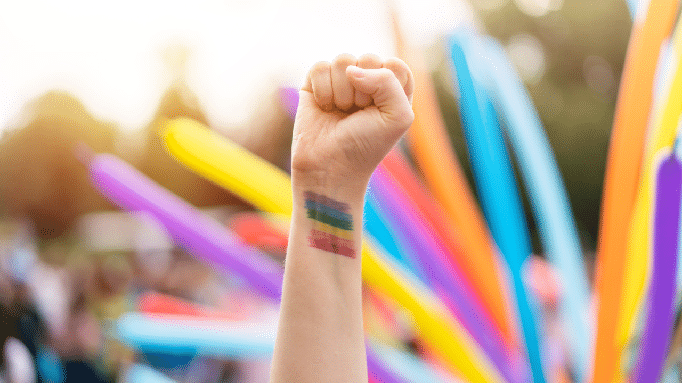
Pride Month. There sure are a lot of strong emotions that come out at the mere mention of this. There are some who celebrate it for themselves. Those who celebrate it for others. Some oppose it completely. And others who couldn’t care less either way.
And it’s not just Pride Month that causes this to happen. It’s any hot topic conversation where there are different sides that feel strongly about their beliefs and opinions about what’s right and what’s not. It’s easy for our emotions to get all tied up in these conversations, or debates, and leave us struggling with our mental health and emotional wellness.
Look, I’m not here for you to like me. I’m here to help you. So I want to dive into some specifics around Pride Month and also share an overall message to help everyone gain perspective around all the hot-button conversations that are going on these days.
But before we get started…
Do you like apples or oranges better?
Oh my gosh, you like apples. Great, we can be best friends. I hate people who like oranges. They’re all such idiots.
OR
Are you kidding me? You like oranges. They’re the most disgusting fruit ever. Sit down so I can tell you a hundred different reasons why you’re wrong for eating oranges and why you should like apples better.
Sounds ridiculous, right? But that’s what we do! We do it to our friends. We do it for our family. And we do it to complete strangers online and in person.
As you continue reading, I invite you to put your beliefs and emotions away for the next few minutes. I encourage you to read the rest of this the same way you might read a textbook or the definition in a dictionary. See what you can learn from it as you leave your predetermined thoughts and beliefs out of it.
I know it’s not easy to do. But I invite you to try. And if you’re kind of a stubborn person who likes to be right…I dare you to try this.
The good side of advocacy
When I think of Pride Month, I think about the people I personally know who are part of the LGBTQ+ community. I think of the ones who’ve shared their stories of being shunned from their church and their families. I think of the ones who have hidden who they were from those closest to them out of fear.
People shouldn’t have to live like that.
People do all different sorts of things with their lifestyles and it’s okay to celebrate that. At the end of the day: a human is a human.
I think it’s important during Pride Month to remember the 1969 Stonewall Riots, the damage caused by the AIDS epidemic, and how it hurt and stigmatized the gay community in the 1980s. This stigma, much like the stigma that surrounds mental health, can be incredibly damaging which is one of the reasons I wrote the book Transforming Stigma.
The work for equal rights has been difficult.
I also think of the stories we hear of transgender women being attacked and assaulted. That crosses a line. It doesn’t matter if you don’t agree with someone’s lifestyle. You don’t attack them.
This month is a good time to remember that people come in all different ways, shapes, forms, and perspectives. And it’s important to celebrate that because too often it’s been shunned. Pride Month presents a real opportunity to celebrate that you can be you. That’s what matters to me. Be yourself and be unapologetic about it.
For those of us who aren’t a part of the LGBTQ+ community, it’s an important time to say that I accept you for who you are. You can be you around me and I don’t ever want you to hold back around me. There’s no judgment here.
The negative side of advocacy
While it’s great to have these days and months where we celebrate certain groups or bring awareness to certain problems in the world, it can reach a point where it’s over the top.
If we’re not careful, it can become forced. Like throwing it in people’s faces. And I think this is where it becomes problematic. I think we see this most often through social media and other forms of media. There are some people who feel they need to constantly push their message.
And that’s a negative side to celebrating any of these awareness months. When your message gets too forceful or over the top, people stop listening.
I also think it’s important to remember that when you’re working hard to unite together around a certain cause, you don’t want to become less tolerant of those who don’t agree with you.
I’ve watched this happen at times within the black community. There are anti-racism advocates who are so passionate about doing great things in the world, and it’s wonderful. But there are times when you see those same people being mean to white people too.
As we celebrate different groups of people, we need to be careful not to take an entitlement mentality where we feel we can say how everyone needs to do things. Personally, I think there should be a line drawn there to keep advocacy efforts effective.
When does creating awareness start to work against a group instead of for it?
When you can no longer have conversations with those who disagree with you because it’s turned into your one-way dialogue, you’ve crossed a line.
Some people can have conversations around these controversial topics without getting angry and arguing. They can listen to the other person share their side and beliefs. When conversation and dialogue are taking place, knowledge is being shared and people are gaining perspective into the way someone else thinks. When you shout at each other, call names or rant, you’re no longer being effective.
We’re never ALL going to agree on hot-button topics
It’s just true. We’re not going to reach a time when everyone feels the same way on these hot-button topics like gender identity, sexual orientation, abortion, politics, or religion. So you can approach these topics by attacking others or you can approach them with love.
It’s easy to think you’re being an “influencer” when all you’re really doing is pushing your opinions and your message out on others. You think being loud and forceful is going to get it done. But you can’t change people like that.
When you put something on social media that people agree with, they’ll like your post. If people disagree with it, they’ll get riled up and comment on your post. And then you can get all riled up too and think things like “I want to fight them.” And that’s all you accomplish.
Your message isn’t received. The sooner you can see this, the sooner you can learn the ways to advocate for what you care about in ways that will lead to awareness and possibly positive change. Until then, you’re just adding to the noise. And it doesn’t matter what side of the conversation you’re on.
Stop thinking that people have to agree with you
Not everyone will agree with you and it doesn’t make them wrong. One person’s truth might not be another person’s truth. If you talk to people of different religions, they both believe strongly in their truth. So who is right and who is wrong? Neither of them and both of them.
When I hear someone present something to me, I take it as what their opinions and beliefs are. It doesn’t have anything to do with me.
We need to stop worrying about agreeing! It’s always about selfishness and ego. Why do we need to agree?
We feel the need to have people agree with us, and I believe it often stems from insecurity. Many times when people feel so strongly about their beliefs, it’s really that they aren’t as confident as they thought and need others to back them up.
If I need you to agree with what I believe, that’s saying something more about me than it is about you.
Focus on listening and understanding
If we could just move past having to have everyone agree with us, we could reach the point of truly listening to one another. And listening can help us to understand someone else’s perspective. That doesn’t mean it’s going to change what we believe, but it allows us to expand our thinking.
If everyone spent more time and effort listening, we’d be in a much better place.
You don’t have to agree with someone, but you can still sit at the table with them.
Agree to disagree but to listen for the sake of understanding. When you do, you’ll gain insight into the other person and yourself.
Learning to celebrate our differences
Being able to celebrate our differences starts with learning to be comfortable with yourself and who you are. If you can’t sit in that, how are you ever going to sit with anyone else?
It’s important to be comfortable with yourself. When you’re grounded in who you are, it doesn’t matter what’s going on around you. It doesn’t matter if people don’t agree with you.
I live in New York City and I love how people are here. You can see men dressed as women and no one cares. Good for you. You be you and show up for yourself. Other people don’t feel the need to push things on each other when they pass someone different than them on the street.
The need to change someone else is all about power. It’s what bullies do on the playground. And it happens in all areas of life no matter who you are. Learn to be aware of it when it’s happening to you. And learn to be aware of when you’re part of the problem.
Learning to be comfortable with yourself
When you have comfort in yourself and who you are, what other people do is not going to change you. But if you’re insecure about who you are, you’re going to feel uncomfortable when someone tries to push something on you. This can lead to being defensive and lots of negative emotions.
If you get offended easily, it says something about you, not about the people around you. If someone else is always getting offended, it says something about them, not about you.
And I’ll go as far as to say that if the people around you are always getting offended, you’re hanging out with the wrong people. I don’t agree with most of the people in my life in many areas. But I love every single one of them and don’t want to change them.
I’ve reached a place of being comfortable with who I am, whether people approve of me or not. If you feel loved or liked when people agree with you, it’s a problem that needs to be addressed. Your confidence should NOT be tied to someone else’s approval or disapproval of you. If you struggle in this area, I encourage you to work with a therapist to develop healthy confidence in who you are.
Always think about your purpose when communicating
The last thing I want to leave you with in this talk about controversial topics like Pride Month is to always know what you’re trying to accomplish when you talk to others. And this includes posting on social media.
If I were to share something like “Trump was the best president ever” or “Obama was the best president ever” on social media, what would be the point of that? If I were honest, the point would be to get some people riled up. I don’t want to live like that and I’m guessing you don’t really want to either. It won’t change anyone’s opinion.
So before you share your message with others, on whatever topic it is, make sure to be purposeful about what you say. Think about the impact it will have on those who hear you. And remember that we don’t have to agree on everything anyway.
On that note, Happy Pride Month to my friends who are part of the LGBTQ+ community. I accept you just as you are.



